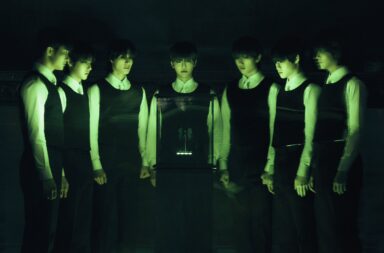
A nocturne is a song for the night, capturing moments of darkness and moonlight. Yet this simple description contains a surprising variety of different interpretations. Does “night” allude to dark nights spent sleepless and alone? Or grimy alleyways filled with pooling shadows? What about passion and love in a quiet moonlit world? What does “night” truly mean?
In this album, “night” is all of the above, and so much more.
Nu’est’s new album The Nocturne takes full advantage of the ambiguity of night, delving into myriad possibilities that produce a wide-ranging yet cohesive album. The Nocturne follows a romance from its peak to its eventual demise. Nu’est’s love story waxes and wanes like the moon, carving a slow arc towards destruction. Each step of the way, Nu’est deliver a new take on the concept of nighttime.
The album starts with a strong, steady relationship. In “Moon Dance,” Nu’est’s vocals drift across a backdrop of atmospheric synths, mimicking the tranquil beauty of moonlit midnights. They implore their lover to stay and dance at night:
Moonlight floods down and shines on you and I
Just don’t get carried away by it, match your time to me
The place my feet are inching towards is you
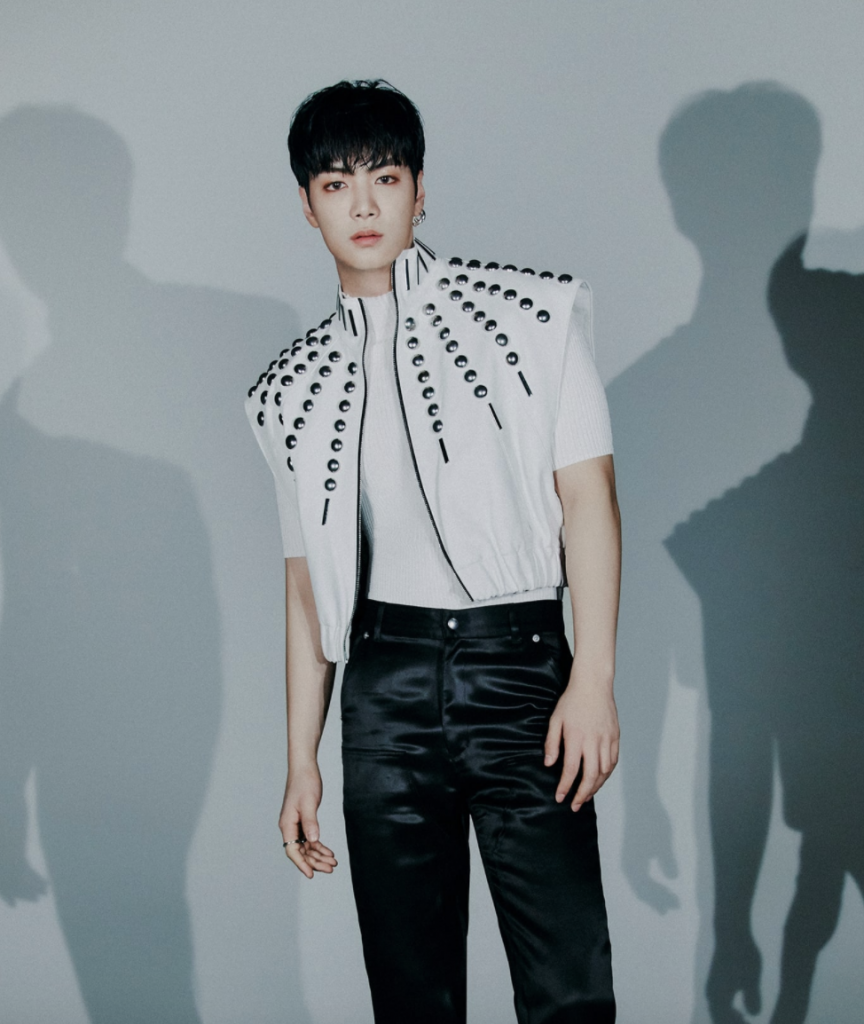
The evocative imagery brings a sense of refinement to “Moon Dance.” Nu’est urge their lover to “close the curtains” and dance, which may be an artful reference to sex. Because the lyrics are never explicit and instead contain sultry hints, the song’s sensuality comes off as elegant. “Moon Dance” portrays the sophistication of nighttime: silver light, dancing silhouettes, and midnight romance.
The song’s musical choices pair well with its graceful lyrics. The verses meander, never quite taking a distinctive form, which creates an aura of mystique. The chorus reverberates with a stronger melody, accompanied by echoing synth flourishes. Yet this chorus is very repetitive: Nu’est sing “dancing in the moonlight” four times, with no variations in melody. The song’s greatest weakness is its overly simple chorus. Without a complex hook, “Moon Dance” is pleasant and polished but ultimately forgettable.
Nu’est’s nocturnal love story continues in “I’m In Trouble.” While “Moon Dance” is stately and lovely, “I’m In Trouble” has a darker edge.
Even words you unintentionally say
Drive me crazy
Oh, I’m in trouble
Nu’est are so consumed by their passion that they’ve come too close to obsession. They’ve fallen too hard. Nu’est can’t stop thinking about their lover, to the point that they don’t even care “if tomorrow is ruined.” This love story, formerly beautiful, has taken a dark and reckless turn. “I’m In Trouble” portrays a second characteristic of the night: danger.
Musically speaking, “I’m In Trouble” stays well within Nu’est’s established sound. The song opens with plucked guitar, then blossoms into a rhythmic mix of pulsing bass and steady percussion. Like in “Moon Dance,” the chorus here is a letdown. It mostly consists of a sequence of three descending notes, repeated over and over again. But because the song establishes a strong sense of rhythm and pulse, “I’m In Trouble” succeeds despite its lackluster chorus. The groove is simply too hard to resist.
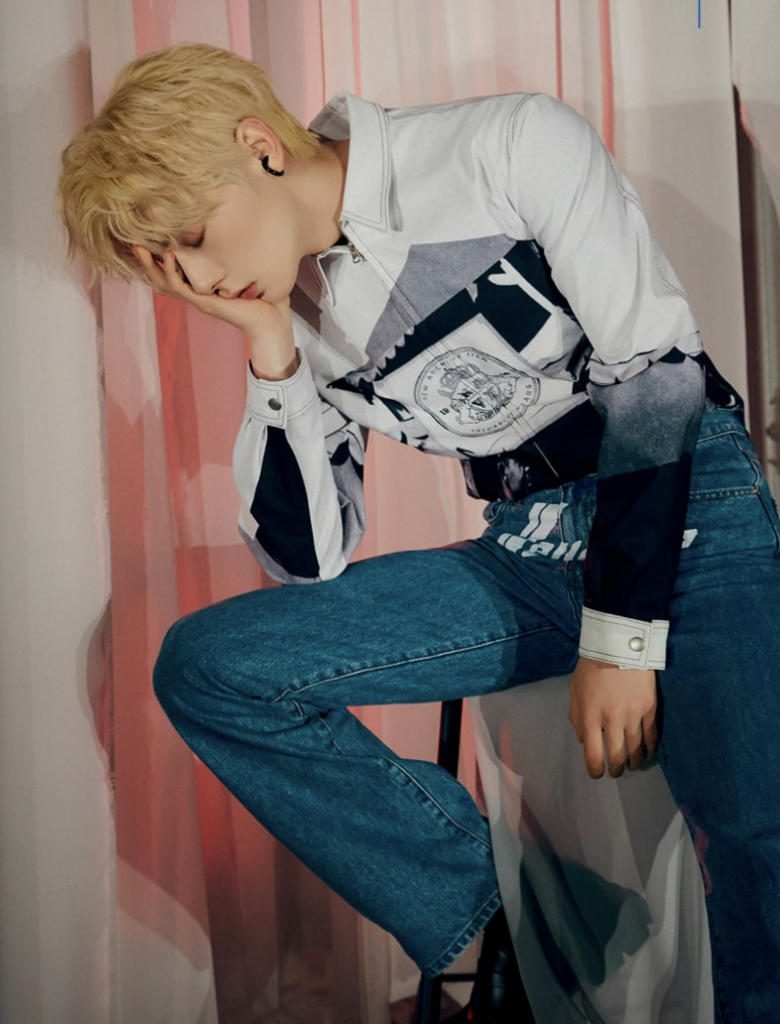
In the next song, “Firework,” Nu’est’s relationship has progressed to an even more precarious stage. No longer self-aware enough to realize how obsessed they are, Nu’est instead celebrate the intensity of their passion. Yet this same passion will soon be their downfall. They sing:
Feels like a firework
Borrow all the time from tomorrow
To make that time before dawn never-ending
Nu’est’s love burns as bright and strong as red-gold fireworks. Just as fireworks are clearly outlined against the dark sky, Nu’est’s feelings for their lover are obvious. But fireworks fizzle out after mere moments. Nu’est insist that this beautiful colorful night feels “never-ending,” but they cannot escape the reality that dawn is coming. When the night ends, so will their relationship.
As a standalone song, “Firework” is an impressive piece of delirious pop. But taken in the full context of The Nocturne, the song seems much less happy. This complexity is what makes “Firework” so compelling — the song is tragic in its dizzy happiness.

The joyous chorus, afloat with falsetto, is a lie. The post-chorus hook, with its beautiful melody, is a self-deception. “Firework” bursts with exhilarating production, but its lyrics portray the ephemerality of night — just like fireworks and the night, love is fleeting. Nu’est’s relationship, like fireworks, is not sustainable.
By the time Nu’est begin singing “Back to Me,” the fireworks have vanished without a trace. Their lover has left. “Back to Me” is an album standout thanks to its memorable chorus. Baekho in particular impresses; during the chorus, his baritone voice pulses with sadness. This song fits in well with the lush soundscapes of the previous tracks, making heavy use of a rippling synth loop.
This night, when things have gone wrong
I’m awoken, I’m awoken, I’m awoken
Everything about you
Feels like a dream
It was a nice dream
Will I ever be able to go back?
Nu’est are “back to me,” back to being alone. They’re stuck with fading memories and intangible dreams, instead of a flesh-and-blood lover. In this song, the members of Nu’est embody the loneliness of night. The moonlit dancing, dangerous obsession, and euphoric fireworks are all left in the past. Nu’est now struggle with the breakup, hoping that their lover will someday come “back to me.”
Nu’est remain lonely in “Must,” remembering how wonderful their relationship was.
Everything that felt like such a given
Like how the night sky is black
I realized they hold so much meaning for me, I miss you

Nu’est took their lover for granted just as we take the night sky for granted. Here, they use nighttime to show that not everything is always as we want it to be. Alone at night, Nu’est reflect on their gratitude and lingering feelings for their departed lover. Nu’est are beginning to move on from their failed relationship, even as they mourn. Must” has the strongest lyrics of all the songs in the album, balancing several complex emotions: heartbreak, loss, love, and thankfulness.
Yet the music isn’t nearly as interesting as the lyrics. “Must” is pleasant, as most ballads are, but drifts by without leaving any lasting impression behind. Fans of the ballad genre may find a lot to love here, but to other listeners, there’s nothing particularly attention-catching. The song consists of an uninspired melody melting into a listless piano arrangement. Is it pretty? Of course. Is it memorable? No. In this respect, “Must” is indeed perfect for the night — it puts me to sleep.
The last song on the album, “Shooting Star,” breaks with the established story arc. This song isn’t the next step in Nu’est’s doomed romance; instead, it’s a fan song.
Six beautiful lights, yeah
Become one and shine down on us, yeah
On the poem we’re filling out line by line
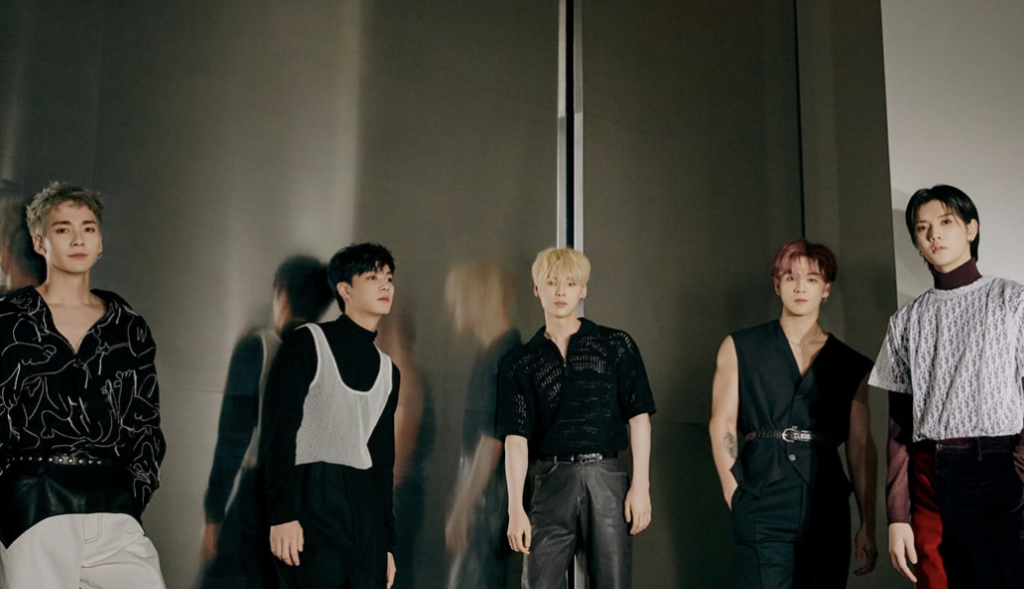
Nu’est only has five members, so it’s implied that fans are the sixth shooting star. The imagery of lights in a dark sky suggests lightsticks at a concert — here, the metaphor of night conveys the sweetness of Nu’est’s relationship with their fans. They thank their fans for being a “source of warmth.”
“Shooting Star” initially comes off as a bit jarring, since its lyrics are a dramatic change from the previous songs. The album starts by basking in a happy love story, but spirals towards instability and loneliness. Ending this tragic story arc with a cheery shoutout to fans feels strange. But upon repeated listens, the charms of this song quickly coalesce. Nu’est have chosen to end a sad album with a hopeful, soothing song. No matter how shoehorned it may feel, there’s no denying this final song’s sheer comfort factor.
The song’s production only enhances this sense of goodwill. “Shooting Star” has the lyrical complexity of “Must,” but also possesses a dynamic melody and arrangement. The song uses handclap percussion to great effect, evoking images of fans singing along with Nu’est. The handclaps, in tandem with the reference to lightsticks, serve as the perfect tribute to Nu’est’s fans. With this in mind, “Shooting Star” is the perfect conclusion to a solid album. It doesn’t fit with Nu’est’s story of a failing romance, but does make for a satisfying finish.
The Nocturne is somewhat marred by weak choruses in the first third of the album. Furthermore, “Must” and “Shooting Star” feel slightly jarring, as their musical and lyrical content (respectively) don’t fit very well with the rest of the tracks.
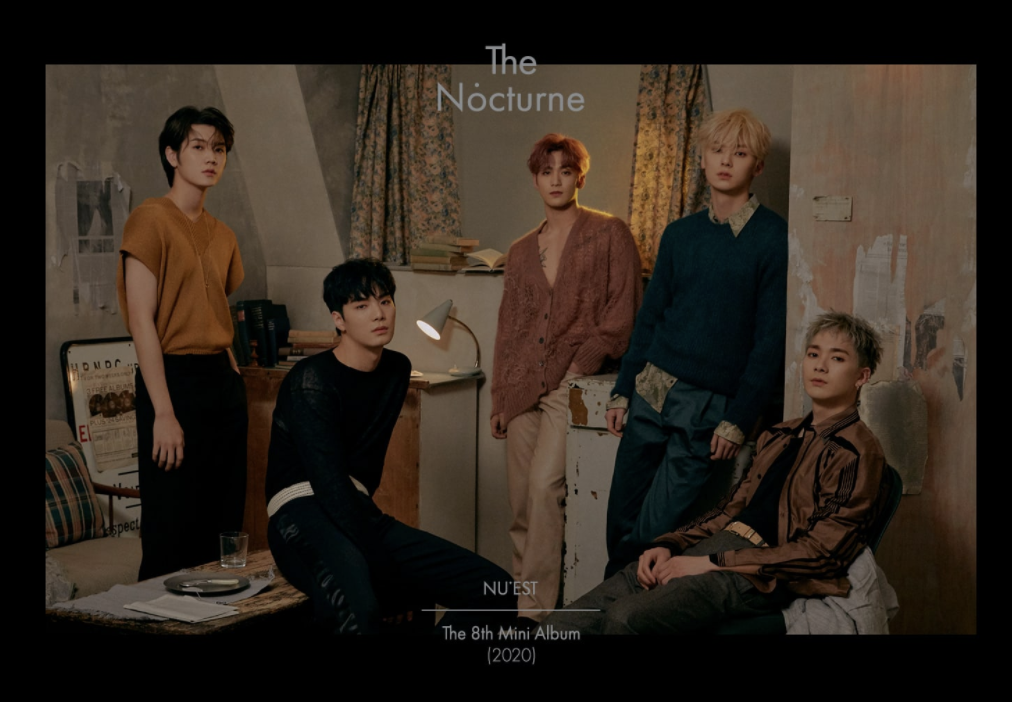
But taken as a whole, the album’s strengths far outnumber its weaknesses. Nu’est portray a whirlwind of different ideas: elegant moonlight, creeping darkness, short-lived fireworks, lonely nights, deep introspection, and finally, calming stars. And they do all of this in the span of a single mini album. The Nocturne is a compelling foray into all things related to the night, made all the more impressive because of its sheer range.
(YouTube. Naver. Images via Pledis Entertainment. Lyrics via Color Coded Lyrics.)

